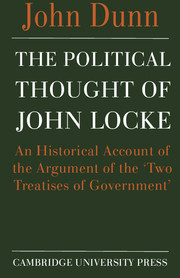 The Political Thought of John Locke
The Political Thought of John Locke Summary
For Professor Macpherson Locke's significance lies in his role as one of the great systematizers of ‘possessive individualism’, a doctrine once historically appropriate to the new bourgeois order but one which now threatens to rivet upon the generations which have escaped from their necessity the immemorial shackles of scarcity. The key to this doctrine is a belief in the rationality of unlimited desire. It sees the essence of man as lying in a infinity of consumption, an infinity of appropriation. In place of traditional, more especially Christian, conceptions in which this relentless libidinal drive was considered a psychological curse, to be ‘fought down’ to the best of men's abilities, concupiscence has become sanctioned, indeed espoused as the rational mode of human existence.
I have tried to question the felicity of inflicting this role upon Locke by pointing out his persisting adherence to a conception of rationality firmly premised upon the reality of an after life. In a calculus of rational choice in which infinite satisfactions are available in another world and only the most discomfitingly finite pleasures accessible in this one it would indeed be remarkable if the decisions judged rational turned out to be a series constructed solely from the full set of immediate terrestrial desires which it was in principle possible to satisfy. Something historically astonishing has taken place when the Calvinist conception of the calling has become assimilated to the duty of a member of a contemporary capitalist society to yearn ceaselessly for consumption.
- Type
- Chapter
- Information
- The Political Thought of John LockeAn Historical Account of the Argument of the 'Two Treatises of Government', pp. 262 - 268Publisher: Cambridge University PressPrint publication year: 1969


